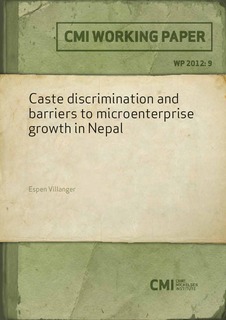| dc.contributor.author | Villanger, Espen | |
| dc.date.accessioned | 2018-01-04T08:17:39Z | |
| dc.date.available | 2018-01-04T08:17:39Z | |
| dc.date.issued | 2012-11-05 | |
| dc.identifier | oai:www.cmi.no:4606 | |
| dc.identifier.citation | Bergen: Chr. Michelsen Institute (CMI Working Paper WP 2012:9) 33 p. | |
| dc.identifier.isbn | 978-82-8062-449-9 | |
| dc.identifier.issn | 0804-3639 | |
| dc.identifier.uri | http://hdl.handle.net/11250/2474781 | |
| dc.description.abstract | Studies of microbusiness in poor countries find high marginal returns to capital but also lack of investments. This paper analyzes how caste-based segmentation in the capital and labor markets can act as obstacles to investment in microbusiness in rural in Nepal and also explain high marginal returns to capital. Using a household survey purposively designed for assessing caste as a barrier to microbusiness growth, we find that segmentation leads to inefficient allocation of entrepreneurial talent, labor and capital. This, in turn, leads to lower wages and smaller and less profitable businesses for low castes (Dalits) and lower economic growth of the local economy. The study covers a range of barriers to doing business and finds that in addition to caste segmentation, access to capital and lack of skills and knowledge are the main constraints to doing microbusiness in the studied areas. | |
| dc.language.iso | eng | |
| dc.publisher | Chr. Michelsen Institute | |
| dc.relation | CMI Working Paper | |
| dc.relation | WP 2012:9 | |
| dc.relation.ispartof | CMI Working Paper | |
| dc.relation.ispartofseries | CMI Working Paper WP 2012:9 | |
| dc.relation.uri | https://www.cmi.no/publications/4606-caste-discrimination-and-barriers-to | |
| dc.subject | Nepal | |
| dc.title | Caste discrimination and barriers to microenterprise growth in Nepal | |
| dc.type | Working paper | |
